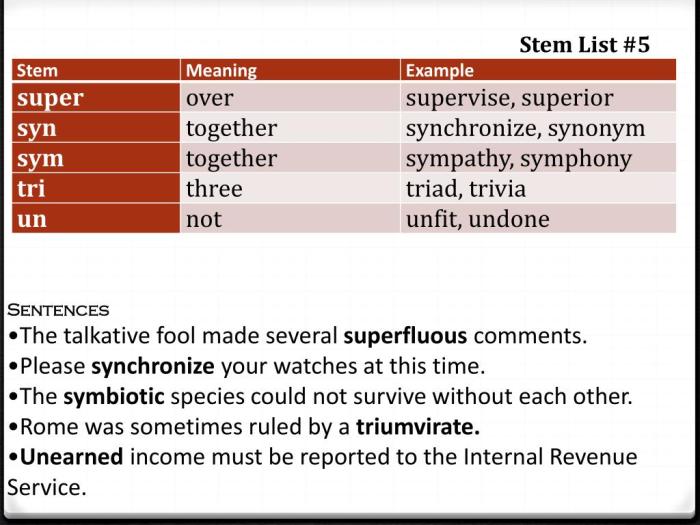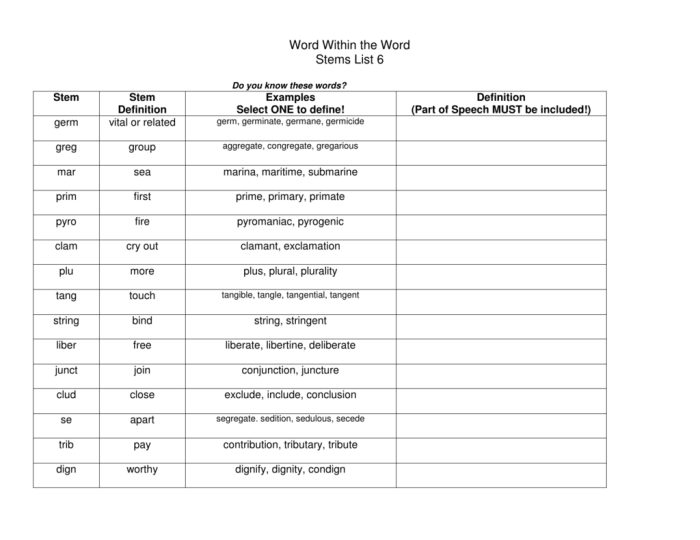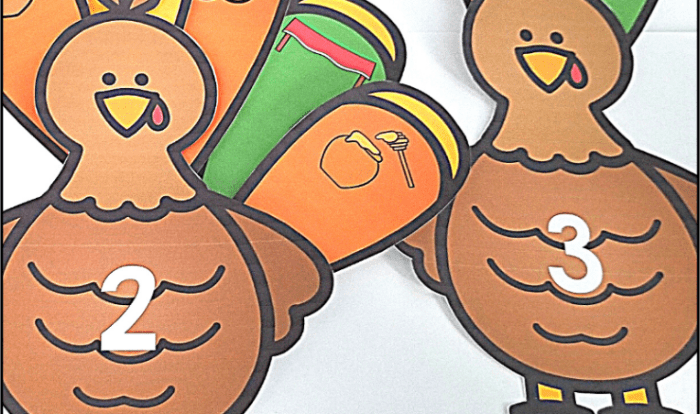Words with the stem ject – Words with the stem ‘ject’ are a captivating linguistic phenomenon, inviting us on a journey through their etymological origins, semantic range, and grammatical functions. From their Latin roots to their diverse meanings and stylistic uses, these words paint a rich tapestry of linguistic intrigue.
The stem ‘ject’ finds its genesis in the Latin verb ‘jacere,’ meaning ‘to throw.’ This etymological foundation shapes the semantic landscape of words that bear this stem, as we shall explore in the ensuing paragraphs.
Etymology of Words with the Stem ‘ject’

The stem ‘ject’ originates from the Latin word ‘jacere’, meaning ‘to throw’. It is a productive stem that is found in a wide range of English words, including ‘project’, ‘reject’, and ‘subject’.
Evolution of the Stem ‘ject’
Over time, the stem ‘ject’ has undergone several changes in meaning. In its original Latin sense, it referred to the physical act of throwing. However, in English, it has come to be used more figuratively, to refer to the act of sending something out or putting it forward.
Semantic Range of Words with the Stem ‘ject’

Words containing the stem ‘ject’ exhibit a diverse semantic range, encompassing various meanings and nuances. These words can be broadly classified into distinct semantic categories, each characterized by a specific set of semantic relationships.
Words with the stem ject often imply throwing something, like “eject” or “project.” In the novel no dogs bark juan rulfo , the main character embarks on a journey to find his father. While the novel doesn’t explicitly use the word “ject,” the themes of abandonment and loss resonate with the idea of something being thrown away or cast aside, which is reflected in the novel’s title.
The primary semantic categories of words with the stem ‘ject’ include:
Category 1: Verbs of Throwing
This category comprises verbs that describe the act of throwing or propelling an object through the air. Examples include:
- Eject: To force something out or expel it.
- Inject: To introduce a substance into something by means of a syringe or needle.
- Project: To throw or send something forward with force.
Category 2: Verbs of Aiming or Directing
This category includes verbs that convey the sense of aiming or directing something towards a specific target. Examples include:
- Conjecture: To form an opinion or hypothesis without sufficient evidence.
- Object: To express opposition or disapproval.
- Subject: To place something under the authority or control of someone or something else.
Category 3: Nouns Denoting Things Thrown or Projected
This category encompasses nouns that refer to objects that have been thrown or projected. Examples include:
- Ejector: A device that ejects something.
- Injector: A device that injects a substance.
- Projectile: An object that is thrown or projected.
Category 4: Nouns Denoting the Act of Throwing or Projecting
This category includes nouns that refer to the act of throwing or projecting something. Examples include:
- Ejection: The act of ejecting something.
- Injection: The act of injecting a substance.
- Projection: The act of projecting something.
Semantic Relationships
The words with the stem ‘ject’ exhibit various semantic relationships between them, including:
- Synonymy: Words with similar or identical meanings, such as “eject” and “expel”.
- Antonymy: Words with opposite meanings, such as “subject” and “object”.
- Hyponymy: Words that are more specific than others, such as “injector” (a specific type of ejector).
- Meronymy: Words that refer to a part of a whole, such as “projectile” (a part of a weapon system).
Grammatical Functions of Words with the Stem ‘ject’

Words with the stem ‘ject’ can serve various grammatical functions in a sentence. They can function as verbs, nouns, or adjectives, each with its distinct syntactic patterns and usage.
Verbs, Words with the stem ject
When functioning as verbs, words with the stem ‘ject’ typically express actions related to throwing, casting, or propelling. Examples include project, eject, and inject.
- The scientist projected the data onto the screen.
- The pilot ejected from the malfunctioning jet.
- The doctor injected the patient with antibiotics.
Nouns
As nouns, words with the stem ‘ject’ refer to the act or process of throwing or casting. Examples include projection, ejection, and injection.
- The projection of the film was crystal clear.
- The ejection of the spacecraft was successful.
- The injection of the vaccine was painless.
Adjectives
In their adjectival form, words with the stem ‘ject’ describe something as thrown, cast, or propelled. Examples include projectile, ejective, and injective.
- The projectile hit the target with great force.
- The ejective seat saved the pilot’s life.
- The injective function maps elements from one set to another.
Stylistic and Rhetorical Uses of Words with the Stem ‘ject’

Words with the stem ‘ject’ often evoke a sense of disapproval or disdain. They can be used to create a negative tone, convey a sense of urgency, or persuade an audience. In literary and oratorical contexts, these words play a crucial role in shaping the impact and effectiveness of a message.
Stylistic Devices
Words with the stem ‘ject’ can be employed in various stylistic devices to enhance the impact of a text or speech. These devices include:
- Emotive Language:Words like “objectionable” and “rejection” evoke strong emotions and can be used to elicit a desired response from the audience.
- Irony:Using words like “subject” or “project” in an ironic context can create a humorous or thought-provoking effect.
- Hyperbole:Exaggerating the negative qualities of something using words like “dejection” or “abject” can emphasize a point and leave a lasting impression.
Rhetorical Devices
Words with the stem ‘ject’ can also be used in rhetorical devices to persuade and influence an audience. These devices include:
- Appeals to Emotion:Words like “rejected” and “subjugated” can tap into the emotions of an audience and motivate them to action.
- Calls to Action:Using words like “project” or “inject” can inspire an audience to take specific actions or make a change.
- Logical Fallacies:Words like “prejudice” or “subjective” can be used to discredit opposing arguments or bolster one’s own position.
Examples
Here are some examples of literary passages or speeches that effectively use words with the stem ‘ject’:
- “To Kill a Mockingbird” by Harper Lee:“She was a curiosity, an anomaly, an object of pity. The rest of the town just let her be.” (Use of “object” to evoke pity and isolation)
- “The Gettysburg Address” by Abraham Lincoln:“We are met on a great battle-field of that war. We have come to dedicate a portion of that field, as a final resting place for those who here gave their lives that that nation might live.” (Use of “dedicate” and “subject” to convey a sense of sacrifice and purpose)
- “I Have a Dream” speech by Martin Luther King Jr.:“I have a dream that one day this nation will rise up and live out the true meaning of its creed: ‘We hold these truths to be self-evident, that all men are created equal.'” (Use of “subject” to highlight the inequality faced by African Americans)
Cross-Linguistic Comparisons of Words with the Stem ‘ject’

The stem ‘ject’ is found in many languages, with varying degrees of cognacy and semantic overlap. By comparing and contrasting words with this stem across languages, we can gain insights into the cultural and historical factors that have shaped their development.
In English, the stem ‘ject’ is primarily associated with the idea of ‘throwing’ or ‘casting out’. This is evident in words such as ‘project’, ‘reject’, and ‘inject’. However, in other languages, the stem ‘ject’ may have a broader semantic range.
For example, in Latin, the verb ‘iacere’ (from which ‘ject’ is derived) means ‘to lie down’, while in French, the verb ‘jeter’ means ‘to throw’ or ‘to cast’.
Cognates and False Cognates
Cognates are words that share a common etymological origin, while false cognates are words that have similar forms but different etymologies. In the case of words with the stem ‘ject’, there are numerous cognates across languages, such as ‘project’ (English), ‘projet’ (French), ‘proyecto’ (Spanish), and ‘progetto’ (Italian).
However, there are also false cognates, such as the English word ‘reject’ and the Spanish word ‘rechazar’, which have similar forms but different etymologies.
Cultural and Historical Influences
The development of words with the stem ‘ject’ in different linguistic contexts has been influenced by a variety of cultural and historical factors. For example, the English word ‘project’ is derived from the Latin verb ‘proicere’, which means ‘to throw forward’.
This suggests that the concept of ‘projecting’ as a form of ‘throwing forward’ is a culturally specific idea that has been shaped by the historical development of the English language.
Detailed FAQs: Words With The Stem Ject
What is the etymology of the stem ‘ject’?
The stem ‘ject’ originates from the Latin verb ‘jacere,’ meaning ‘to throw.’
What is the semantic range of words with the stem ‘ject’?
Words with the stem ‘ject’ cover a wide semantic range, including concepts related to throwing, casting, projecting, and rejecting.
What are the grammatical functions of words with the stem ‘ject’?
Words with the stem ‘ject’ can function as verbs, nouns, adjectives, and adverbs, depending on the context.
